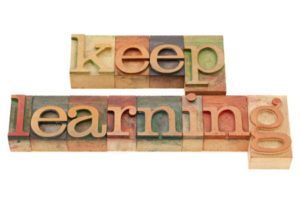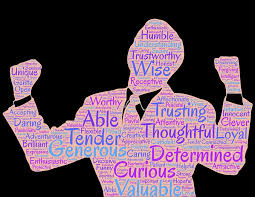Last week I wrote about the Ability
to Learn in the context of Soft Skills. My comments about self-awareness
solicited a response from one of my readers – thanks Mark (see his comments below) – for some powerful questions and your
comments. This week I intended to continue my exploration of learning and of
criticism but after reading Marks’ comments I felt I needed to expand on the
topic of Self-Awareness and in doing so, respond to his questions.
My journey towards self-awareness started some years ago by
trying to understand the kind of leader I am, which I wrote about in an earlier
blog: https://johnkwhitehead.ca/core-leadership-self-awareness/.
My personal journey continues and here
is what I have learned so far.
We can only be assured of our own self-awareness. We can present
this “state” to others if you will, but we cannot know how others are feeling, their
state of “self-awareness” or what they are thinking unless they tell us. We can
then attempt to judge for ourselves whether we want to accept that or not. This
in itself becomes a “self-awareness” action, as in doing so we need to be aware
of what we know and how we are “feeling” about the situation.
Self-awareness is an on-going learning process, which is why
I tied it to the ability to learn (https://johnkwhitehead.ca/soft-skills-ability-to-learn/).
We really do need to believe that learning is important or why do it? And by
taking on “learning” we in turn become more self-aware.
Self-awareness is a state of mind; it is something many of
us actively pursue. I have come to understand that people pursue self-awareness
for a variety of reasons, all valid as they are theirs. They may be seeking an
answer to a challenge they are facing or reflecting on an event that has
impacted them. It occurs to me that there is a long history of this practice — self
reflection is major component of many belief systems, and the practice of
self-discovery is an integral part of that. Without getting into the mystical,
the practice of spending time in reflection brings with it the opportunity for
a deeper understanding of one’s thoughts, feelings and beliefs.
I tie self-awareness to emotional intelligence (EI) and the
model designed by Sparrow & Knight (2006), which breaks EI down to Intrapersonal Intelligence (self-awareness
and self-management) and Interpersonal Intelligence
(other awareness & relationship management) or, as I teach in my Social
Styles workshops, Know Yourself, Control Yourself, Know Others, Do Something
for Others. Sparrow and Knight state that EI is the habitual practice of
- Using emotional information from ourselves to
other people;
- Integrating this with our thinking;
- Using those actions to inform our decision-making
to help us get what we want from the immediate situation, and from life in
general.
In other words, EI is using thinking about feeling (and
feeling about thinking) to guide our behaviour (Neale, Spencer-Arnell &
Wilson, 2011). Chade-MengTan (2012) uses Ebenezer Scrooge in A Christmas Carol as an example of someone
with very low intrapersonal intelligence and describes how it took three the
intervention of three ghosts to raise his self-awareness. Raising
self-awareness is raising our EI. Although we don’t have the opportunity to
have ghosts to demonstrate to us the levels of our own self-awareness
(thankfully), we do have other tools at our disposal, such as formal 360
assessments and behaviour profiles such as Tracom’s SOCIAL
STYLE and Versatility profile. We can also solicit feedback from family and
friends to check if our perception of ourselves matches how others see us.
These tools can give us a start in increasing self-awareness.
As a coach I see this often in my client sessions. As they
grasp a better understanding of the challenges they are facing, they get a
better understanding of who they are, and become more self-aware. I can
actually see the moment of realization or recognition: the client’s body
position shifts, facial features change and often they vocalize it in some way.
As a coach I can help a client become more aware of themselves as I lead them
into a deeper exploration of the challenges they may be facing. The technique I
use with clients to help them become more self-aware is to journal. I ask them
to articulate each day’s events and progress as a means of recording how they
were “feeling”, how their body was reacting, getting them to recognize triggers
and then how to use them to achieve their desired changes. This can be a
process of days, weeks, or even longer, but over time the act of just doing it raises
their self-awareness and can lead to change. My role in that activity is to
hold them accountable to doing it and to ask the questions around what they
learn and how that can use that learning to create sustainable self-awareness
and change.
Comment from Mark
I found your post interesting and addressing all the aspects you
mention, a challenge!. Reading it, I found some questions arose as I’m struggling
to get to grips with understanding my own self-awareness. It is
continuously reinforced that self-awareness is crucial and I’m keen to gain
assurance that I am self-aware. Even so, I am finding it tricky to distil a
clear understanding of self-awareness and the means by which I can know
(instead of feel or believe) I am self-aware. I’m also having a similar
difficulty with knowing if someone else is self-aware or not.
If there is
no way to know we are self-aware, then if anyone believes they are self-aware,
they are with absolute certainty self-aware as there is no way to prove
otherwise. It’s obviously not only about knowing our strengths and weaknesses
as we could confirm these via external feedback.
With the
importance of self-awareness no one wants to think themselves as not
self-aware. However, without a means to know you are self-aware, anyone who
thinks they are self-aware is with absolute certainty self-aware as there is no
means to know otherwise. Furthermore, if there is no way to know I am
self-aware, there is no way to compare self-awareness with others.
This
situation being the case, it makes discussion and promotion of self-awareness
redundant and superfluous as every view in every discussion is unquestionably
right, correct and true for that individual and no one else can disprove this
view.
This this
cannot be the case as your valuable contribution reinforces the need and
importance of self-awareness, adding to the daily reinforcement, which can be
found across the web and social media. With such a consistent reinforcement, it
makes sense that the knowing associated with self-awareness has been addressed
providing a clear means to know (not believe or feel) any individual is
self-aware or not. However, I’m struggling to pin this down and obtain clarity
about how I can know I’m self-aware.
I’d
appreciate your insights/pointers with regards the means by which you know you
are self-aware and are able compare self-awareness with others on a platform of
knowing rather than feeling or believing. I hope this makes some sense. –
Mark

 I am a strong believer in continuous learning. If you have been following this blog for some time you will know that I am constantly looking for opportunities to learn. I often tell the story of the time I and some colleagues were in a management meeting when the topic of learning came up. At the time, two of us were reading Marshal Goldsmith’s book, What Got You Here, Won’t Get You There (Hyperion). The third person chimed in with a statement that not only struck me as idiotic then, but still causes me to shake my head in disbelief today. He said (and I’m paraphrasing), “I don’t read any of those kind of books anymore. Since I have my MBA I know all I need to know.” I remember the setting and the individuals and those words so very clearly even though this happened almost ten years ago. Its effect on me became so profound that I am sure it had some part in my decision to go back to school in 2010 to get my MA. How could someone believe that they had nothing more to learn?
I am a strong believer in continuous learning. If you have been following this blog for some time you will know that I am constantly looking for opportunities to learn. I often tell the story of the time I and some colleagues were in a management meeting when the topic of learning came up. At the time, two of us were reading Marshal Goldsmith’s book, What Got You Here, Won’t Get You There (Hyperion). The third person chimed in with a statement that not only struck me as idiotic then, but still causes me to shake my head in disbelief today. He said (and I’m paraphrasing), “I don’t read any of those kind of books anymore. Since I have my MBA I know all I need to know.” I remember the setting and the individuals and those words so very clearly even though this happened almost ten years ago. Its effect on me became so profound that I am sure it had some part in my decision to go back to school in 2010 to get my MA. How could someone believe that they had nothing more to learn?
